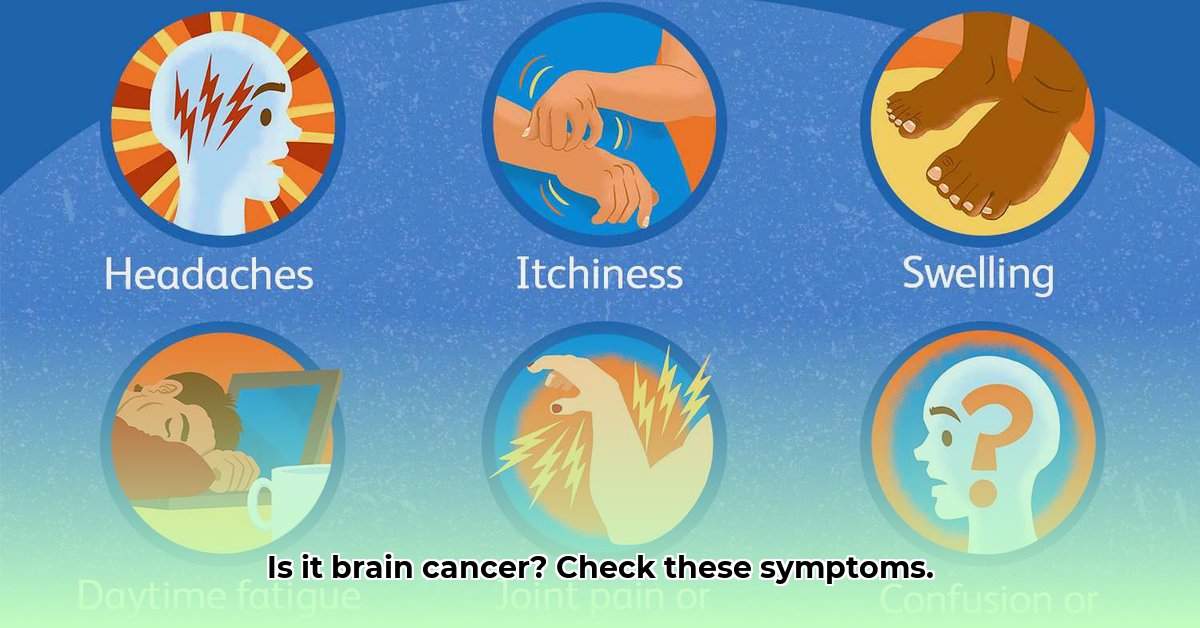
Discovering you might have brain cancer is understandably frightening, but early detection significantly improves treatment outcomes. This guide helps you understand potential symptoms specific to women, empowering you to seek medical attention if needed. Remember, this isn't a diagnosis; it's a guide to prompt you to consult a healthcare professional.
Common Signs: When Your Body Signals Trouble
Many brain cancer symptoms are similar in both men and women. Let's explore some common ones:
Persistent Headaches
These aren't your average tension headaches. We're talking about severe, persistent headaches that worsen over time, maybe changing in nature. Nausea or vomiting might accompany them. Painkillers offer little to no relief. Are your headaches becoming increasingly severe and frequent, resisting usual pain relief?
Seizures
These aren't always the dramatic convulsions often portrayed in media. Seizures can manifest as brief confusion, temporary loss of awareness, or even just a strange twitching. Any unexplained fits or neurological events need immediate attention. Have you experienced any unusual neurological events, such as brief periods of confusion or unexplained twitching?
Nausea and Vomiting
Persistent nausea and vomiting, especially with severe headaches, are significant warning signs. Don't ignore frequent, intense nausea without a clear cause. Is your nausea persistent and severe, unrelated to other known causes?
Vision Problems
Blurry vision, double vision, or any unusual changes in your eyesight are potential red flags. Even subtle changes warrant a check-up. Have you noticed any new or worsening issues with your vision, such as blurry or double vision?
Less Common but Important Symptoms: Subtle Clues
Some symptoms are subtle and easily dismissed as stress or tiredness. Pay close attention to even minor changes:
Personality Shifts
Noticeable changes in your mood, personality, or behaviour? Increased irritability, withdrawal, or unusual emotional swings could be indicative of a problem. Have you experienced any unexplained changes in your personality or mood, such as increased irritability or withdrawal?
Memory Problems
While forgetfulness is common, sudden, significant memory lapses or difficulty concentrating need evaluation. Are you experiencing unusual difficulty remembering things or concentrating, a significant departure from your baseline?
Weakness or Numbness
Weakness or numbness in one side of your body, affecting a limb or facial area, is a serious symptom. Any unexplained weakness demands investigation. Have you noticed any unexplained weakness or numbness in one side of your body, especially affecting a limb or your face?
Coordination Difficulties
Stumbling more often? Finding simple tasks challenging? Difficulty with coordination, balance, or fine motor skills should raise concerns. Have you experienced any issues with your coordination, balance, or fine motor skills such as difficulty buttoning your shirt or writing?
Speech Problems
Struggling to find the right words, or is your speech slurred or unclear? These changes can be early warning signs. Have you noticed any changes in your speech, such as difficulty finding words or slurring?
Being a Woman and Brain Cancer: Unique Considerations
While many symptoms are shared, women face unique aspects:
Hormonal Influences
Hormonal fluctuations can impact brain health. While normal at various life stages, significant or unusual changes warrant discussion with your doctor. Has there been a significant or unexplained change in your hormonal balance?
Specific Tumor Types
Research suggests links between certain brain tumors and hormonal changes or life stages in women. Regular check-ups and open communication with your healthcare team are crucial. Are you aware of any research linking specific brain tumor types to hormonal changes or life stages in women?
Migraines
Distinguishing migraines from brain cancer symptoms can be difficult. If your migraines change or become more frequent, seek medical attention. Have your migraines changed in frequency, intensity, or character?
When to See a Doctor: Act Early
Don't delay seeing a doctor if you have any concerns, no matter how small they seem. Many symptoms have other causes, but early detection is crucial for brain cancer. Seek medical attention if:
- Symptoms are persistent or worsening.
- Symptoms are new and unexplained.
- You have a combination of symptoms.
Diagnostic Tests: What to Expect
Diagnosing brain cancer involves:
- Neurological Exam: A detailed examination assessing reflexes, coordination, and cognitive functions.
- Imaging Tests: MRI or CT scans provide detailed brain images to detect abnormalities.
- Biopsy: A tissue sample is sometimes needed to confirm a diagnosis.
Your Action Plan: Steps to Take Control
- Symptom Diary: Record all unusual symptoms, including onset, frequency, and severity.
- See Your Doctor: Schedule an appointment immediately.
- Follow Medical Advice: Adhere to your doctor's recommendations.
- Communicate: Maintain open communication with your healthcare team.
Early detection significantly improves outcomes. This information is not a substitute for professional medical advice. Take charge of your health and don't hesitate to seek help if you have concerns. Your health is invaluable.
"The peace of mind gained from seeking timely medical advice is invaluable," says Dr. Anya Sharma, Neuro-Oncologist at Johannesburg General Hospital.